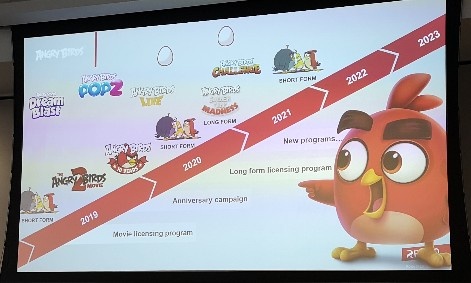Rovio’s licensing division represents just a small fraction of the company’s overall business these days. But earlier on in the firm's life, it represented nearly half its revenue.
Speaking at Casual Connect Europe today, Rovio marketing director Stephen Porter went through the Finnish company’s 10-year history.
He discussed the developer’s rapid ascension with the Angry Birds IP and early dominance of the mobile market before free-to-play came and ate up its premium games business.
Rapid growth
In 2010, Rovio had 28 staff but had quickly racked up 50 million downloads and helped partners sell 40,000 licensed products based on its burgeoning IP.
As Porter put it, going into 2011 is when the team realised it had struck gold.
During that year the firm expanded exponentially to 225 employees, racking up 500m downloads across its portfolio. The licensing division also had explosive growth, helping its partners to sell 30m licensed products.
At this time, 70 per cent of its €103m revenue came from games and 30 per cent came from licensing.
Peak Angry Birds
Porter described 2012 as ‘peak Angry Birds’ and a period where licensing was close to being the dominant source of revenue for the company. This was the year the company struck partnerships with NASA and Star Wars.
Rovio’s headcount grew to 518, while the number of lifetime downloads more than doubled to 1.3 billion. Over 416m licensing units were sold, representing 45 per cent of its €152m revenue.
At this time, the company had over 200 partners for various products.
The next few years saw the company still grow, but free-to-play headwinds were about to hit and the company lost some of its focus. As Porter put it, “in hindsight our heads had been slightly in the clouds” as it rode the highs to all corners of its business, spreading itself thin in some areas.
In 2013 Rovio grew to over 800 employees, racking up two billion all-time downloads. 436m licensed products were sold, with licensing now representing 47 per cent of its €156m revenue.
Brand fatigue
In 2014, Porter said the first sounds of brand fatigue started to arrive. Porter admitted that the team was already starting to talk about being an evergreen brand after just five years on the market, but Angry Birds now didn’t have the same relevancy of past years.
Rovio had been looking for profit anywhere, licensing out the brand to anything from HDMI cables to duct tape and fishing lures. At this point however the company started to question: what are we saying about our audience?
The number of employees dropped to 690, despite crossing the 2.5bn downloads milestone for its games. It sold significantly less licensing units, 295m, this year. Sales for the division made up just 26 per cent of its €158m revenue.
2015 was a “pretty dark year” for Rovio. The number of staff was further cut again to 470. Downloads continued to grow to 3.1bn, but again the licensing division fell to 226m units sold, representing 20 per cent of 142m in sales - a decline in overall sales from the previous year.
However, this was the year Rovio launched Angry Birds 2. While that title got off to a poor start, successful live ops have seen the game change significantly and become the company’s flagship game. In 2018 it brought in €117m in revenue on its own, bringing the game’s lifetime sales to €253m.
Flying high
Over the next few years, revenue for Rovio started to grow once again thanks to sales from its growing free-to-play portfolio and the Angry Birds Movie. Revenue increased from €192m in 2016 (€33m from licensing) to €297m in 2017 (€49m from licensing) and to €281m in 2018 (€31m from licensing). Lifetime downloads as of 2018 stood at 4.5bn.
Licensing only represented 11 per cent of revenue as of 2018, with games the clear sales driver for the company.
Porter said Rovio now sees itself as a games-first entertainment company and is focused on quality over quantity.

PocketGamer.biz is heading to London this week with our own free 'East Meets West' mini-summit for the games industry on the evening of Wednesday, May 29th, in association with Mintegral.




















